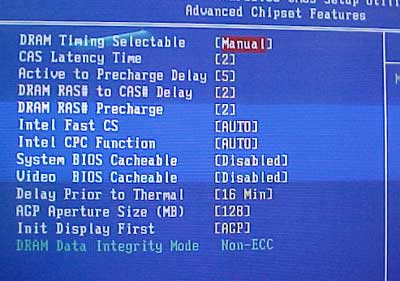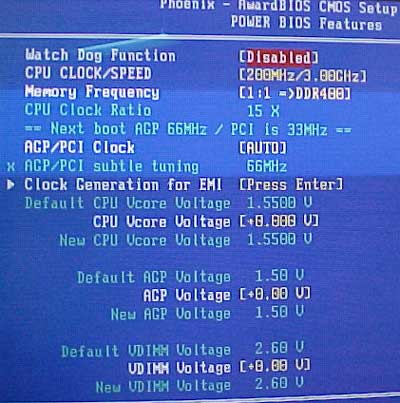We've been very lucky when
it comes to overclocking Epox motherboards in the past, and were expecting the tradition to continue
as the 4PCA3+ was powered up.
Back in the day of the Epxo 8KHA+ we were able to hit an
almost unheard of 170 MHz FSB (back then). With the Epox 8K5A2+ we passed the 231 MHz
FSB mark. And with the Epox 8RGA+ we reached 230 MHz FSB. Would the 4PCA3+ continue this
tradition? We certainly expected it to.
Using a
Pentium 4 3.0C we started to raise the FSB slowly, but didn't
get very far. In the end the highest we could go was 216 MHz FSB! Raising
the CPU, memory or AGP voltage did not seem to help at all. The Northbridge
heatsink was only luke warm so we're at a bit of a loss to explain the
relatively low overclock.
Of course overclocking is luck of the draw, and
we're bound to get a poor overclocker every now and then.
The 4PCA3+ BIOS:

Epox gives the end user complete control
over the memory timings, fro CAS Latency to RAS to CAS, and RAS Precharge. You
even have the CPC function (which I hear is suppose to be disabled at high
FSB's).

One thing that I have always liked about Epox are that
their BIOS's are very straight forward and easy to use. You can go up to a
maximum FSB of 350 MHz in 1 MHz increments.
There are the usual 1:1, 5:4
and 3:2 memory dividers (for P4 C processors). AGP voltage goes as high as 2.1V
and memory voltage can be raised to 3.3V!
The maximum CPU voltage available is 1.6V which is a bit limiting considering how high the
memory and AGP voltage will rise to. There are quiet rumblings that revision
2.0 of the 4PCA3+ will allow for CPU voltages to rise past 1.85V. Up
next, the benchmarks!
